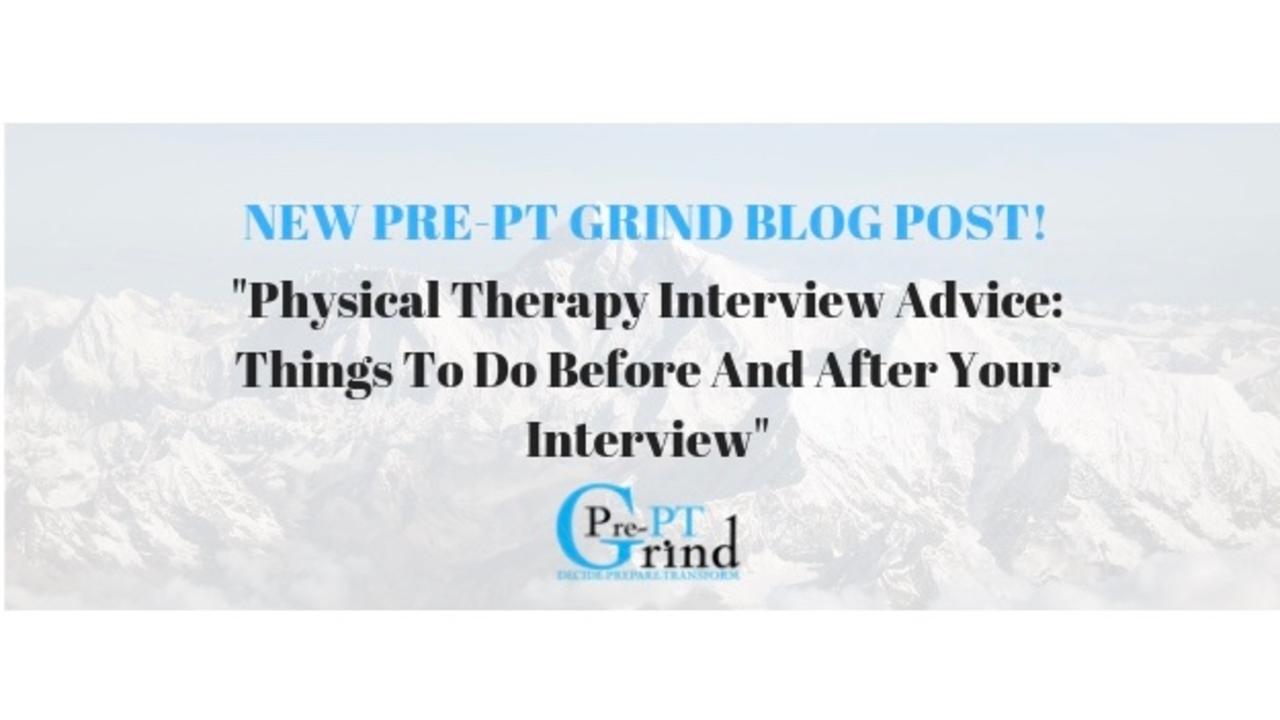5 Steps You MUST Consider If You Want To Give Yourself A Shot At Becoming A DPT

Prior to starting the application process, identify your fears. We all have similar fears, anxieties, and frustrations. We feel isolated or as if we can’t handle it on our own. We fear the unknown, we lack direction, and we constantly question our ability by asking ourselves “what if I apply and it doesn’t work out or I don’t get in?” or “what if I apply and I have to settle for what my professor, family member or friend said I should do instead?” Prove your fears wrong and give yourself a SHOT. At the end of the day, that’s better than not trying, right?
Step one: No Surprises
Understand the other side of the equation- the admissions side- so that there are no surprises. Know exactly what the program is looking for and what the program favors (GPA, GRE scores, etc). Look up any information you need on schools website or PTCAS. Use a GPA calculator to make sure you have the what the school is looking for. Do everything you can to make sure you’re a good match for the program. Kno...
9 Ways To Get A Head Start On Your Physical Therapy School Application

If you're planning to apply to physical therapy school in the future, here are some helpful tips on some things you can start doing to get a head start on your physical therapy school application:
As a first time physical therapy school applicant:
1. Start to look up programs
Come up with a list of “realistic schools” (schools that your GPA, GRE, and observation hours etc. align with their minimums) that you can apply to. Research the heck out of each program: look at class size, location, cost, clinical affiliations, everything about that program! If you don't meet the minimum requirements for a PT program, don't waste your money or time applying. Most of the time, if you don't meet the minimum requirements, the school won’t look at your physical therapy application.
If there's a PT program that you meet the bare minimum requirements and want to apply to, go for it! Just be aware that there may be other competitive applicants that have higher "statistics" than you do. It never hu...
How to Ask for a Physical Therapy School Letter of Recommendation

Sometimes, you just need to take the first step. The thing that is the most difficult for you to do can turn out to be very rewarding. We often overlook this and get caught up in fear. The fear of rejection is a powerful and crippling tool. You can easily get caught up in the idea of being denied something you want. When we were small children, we grew accustomed to believing rejection was a bad thing. Looking from the surface value, we will relish in the negative of the situation. However, once we look beyond the surface, we can see the positives. Rejection even though it can be harsh, it can also be a great motivator and teacher. This only happens once a person makes up their mindset to take possession of a victor mentality.
"..you need to be respected and be known as a hard worker."
Mindset is going to help you to attain your goal. Map out in your mind how you want life
to unfold for you. This could be in the form of short term or long-term goals. For the sake of the conversation I...
Physical Therapy Interview Advice: Things To Do Before And After Your Interview

You can't really explain that feeling when you get an email saying, "You've been invited to a physical therapy interview day!" You'll start to get butterflies and be really nervous, but that's totally normal. You have worked SO hard to get to this step in your pre-PT journey, and you DESERVE IT! Now, it's your time to shine and show that PT program why you deserve to hold a seat in their class.
PT programs invite applicants to interviews because they really want to know what type of person you are and how you might fit into their program. Each program has their own "style," and they really want to see if it's a good fit for you too. They want to see how you present yourself (especially in a stressful situation), how you dress, and how you communicate with others. It may not seem like it, but PT programs do look at the little things too! Here are a few things that you can do before and after your physical therapy interview to help put you in the best position to get into PT school:
1....
Should Physical Therapy School Rankings And Location Matter?

One question we get from pre-PT students a lot is “should physical therapy school rankings and location matter?” Let’s say you’re specifically looking at this one school that has a ton of great reviews, it’s known for being prestigious, and you’re thinking it might look good on your resume when you’re trying to find jobs. The real question is, does all of that matter to you? Because if you care about that, then it matters, right? You’re the one going to that school. You’re the one putting in 3 years of doctorate level schooling. You’re the one paying tuition.
But in general, applying to physical therapy school is not like applying to medical school. Location or rankings do not matter when applying to physical therapy school. It’s not necessarily like med school where your future employer might look at your resume and say, “Oh, you went to Harvard, that’s a very prestigious school.” In that profession, yeah, they might look at where you went. Some employers might only take Harvard grad...
How To Make Extra Money As A Pre-PT And PT Student!

Let’s face it, undergraduate loans and future graduate school loans all ADD UP. It can almost feel like you’re drowning in money that you don’t have. One of the biggest questions we get from pre-PT students is: “How can I make more money before I start PT school? And what about when I’m a PT student?” What’s a good “side hustle”?
Who DOESN’T want to make money? While having money right now in the present is great, you have to think about the bigger picture too. Looking at the bigger picture will allow you to not only stand out as a pre-PT applying to PT school, but you’ll also be setting yourself up for a successful career. Even as a PT student, learning how to earn extra money while killing it in PT school will make you that much more valuable!
What are some different ways to make money that you’ve heard of? What would be a good source of revenue? Here are some different side hustles that we think are good avenues for making some extra money:
Rehab aide/PT tech
This is definitely ...
Received a Low Grade in a Prerequisite Class..What's Next?

So, you ended up getting a low grade in a prerequisite course. A required course to get into PT school. What happens now? What do you do next?
#1- You have to know why you got the low grade in the first place
You first have to figure out if you actually understand why you didn’t do well in that class. Why didn’t you get the grade you wanted? Were you motivated? Did you like the class? Did your professor not teach it well? Did you not understand the material? What was it about that class that caused you to get a low grade? Understanding the answers to these questions is a crucial first step. If you want to raise/continue to raise your GPA, you HAVE to understand those answers. You have to attack your weaknesses in order to bounce back.
#2- Attack the weaknesses that led you to get that low grade
Was it your motivation or interest level? Did you have other things in life going on at that time? Was sleep more important? Was going out more important? Did you have a job that you had to ...
My Experiences with Early Decision and Finding My Niche

"My advice: stay true to yourself. Finding the right program for you is crucial."
Hi everyone! My name is Bri Zabierek and I am a first-year SPT at Rosalind Franklin University of Medicine and Science (RFUMS in short). When I applied during the 2017-2018 cycle, I chose to do early decision, or ED. Some people have heard of it, some people have not. So here’s my experiences with ED, what it means and things to consider when applying!
First things first – What is early decision? Basically, ED is binding option to your first-choice school. You submit your materials very early – like within 2 months of the application opening – and if you’re accepted to that one school, you’re in. Your process is over. The catch is, it involves ONE program and NOT ALL programs accept ED applicants. So why did I want to do ED? Why did I commit my chances of being accepted to only one program so early? Well, I found my favorite program and I wanted in. That’s why.
This brings me to my second topic. If yo...
Leveraging Yourself As A Student-Athlete When Applying To Physical Therapy School

“As a student-athlete, I haven’t had time to do much else.” As a collegiate athlete applying to physical therapy school, you may think you’re behind the 8-ball because you didn’t have the time to complete full-time internships, study abroad, or have a ton of campus involvement. Was all that time you put into honing your craft on the court/field really worth it when it comes to your future career? The answer is YES! Being a student-athlete is the best decision you have ever made in preparing yourself for graduate school and the professional world.
As an athlete, you have learned and developed skills that are directly transferrable to the profession of physical therapy and PT school itself. Everything you learn both on and off the field is not a back-up plan for life after sports, it is part of the rest-of-life plan for life after sports. Being a collegiate athlete requires rigorous mental and physical demands that directly correlate to the demands of physical therapy school. PT school ...
My Pre-PT Story and What I Would Have Done Differently

It was a couple days before I started my first day of PT school. I was standing in our school’s parking lot looking up at the Wasatch Mountain range just a mile from where I was standing. It was quite magnificent for a Midwest girl who had just moved west for the first time. My dad had just called and during the conversation he asked, “Now Kristen you ARE 100% sure this IS what you want to do, right? You know that’s a lot of debt you’re going to accrue, I just want to make sure before you go into it.”
“Yes dad, of course, this is what I want to do!” I remember this moment so vividly, answering that question with a positive “yes!” but actually thinking “I’m not 100% sure but I just feel it’s going to to get me where I want to go.”
As a high schooler I thought I had to have my whole life figured out at age 16, and when I was a junior in high school I decided I wanted to be a physical therapist. So that’s what I set out to do once I started college. I decided on pursuing PT through an...
